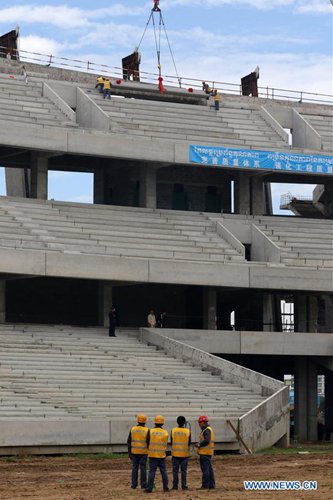HOME >> CHINA
China-Cambodia ties stable despite gambling discord: observer
By Wang Qi Source:Global Times Published: 2019/9/18 21:33:40

Workers install the final piece of concrete seat at the China-funded national stadium in Phnom Penh, Cambodia, July 29, 2019. (Photo by Li Lay/Xinhua)
Chinese observer dismissed rumors that about 100,000 Chinese left Cambodia in seven days as the country clamped down on illegal gambling.
"The number of those who returned back to China from Cambodia recently is about 3,000 to 5,000," Lin Jiaxu, a People's Daily reporter based in Phnom Penh, Cambodia, told the Global Times on Wednesday, "and most of them were driven out by the countries' online gambling ban."
Foreign media reported that tens of thousands of Chinese nationals were leaving Cambodia following a government ban on online gambling intended to reduce the number of crimes committed by foreigners.
That number was exaggerated, Lin asserted.
The Chinese Embassy in Cambodia could not be reached at press time.
In recent years many Chinese people have invested in Sihanoukville, stimulating local consumption and economic growth.
But social problems involving Chinese residents soared as well, including illegal gambling, cheating and robbery. Gambling is illegal on the Chinese mainland.
China's Embassy in Cambodia on August 3 reminded Chinese nationals to be cautious about visiting Sihanoukville, closely pay attention to their safety in the city and be sure to stay away from pornography, gambling and drugs.
It was true, Lin said, that gambling in Cambodia was viewed by many foreigners, including Chinese, as a shortcut to wealth via cheating and extortion.
Sihanoukville, a coastal city, attracted many such Chinese seeking opportunities in the industrial chain.
The Cambodian government was not singling out Chinese people, but targeting all criminals, domestic and overseas, Lin noted.
Although residents were unsatisfied with the illegal behavior of some Chinese in the city, overall the countries' friendship and cooperation remained still firm and stable, Lin said.
China is the biggest investor in Cambodia, and Chinese companies have assisted the country in infrastructure construction, agriculture, tourism and telecommunications.
RELATED ARTICLES: